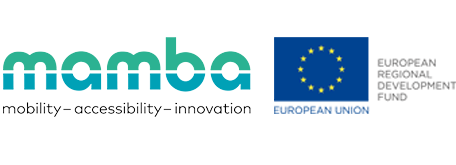
A core Mamba activity is our partners’ ongoing implementation of nine innovative pilot projects/actions to improve mobility and service accessibility for residents in rural areas. The pilots include transport on demand (ToD) services; car sharing and ride sharing applications; mobility as a service (MaaS) systems; and combined mobility solutions. The pilots will be tested by users, and results, success factors, barriers etc. will be documented. Ultimately, the pilots will serve as transferable solutions for other rural areas in the Mamba partner regions and beyond. The results will be presented at six local mobility seminars; at a final conference for all Mamba stakeholders in Berlin 2020; and in the coming Mamba database and rural mobility compendium.
Some pilots have information in local languages as well, press read more to find out.
Learn more about each pilot action below – including contact persons!
Building on the learnings from the pilots, Mamba partners will also establish physical or digital Mobility Centres in nine rural areas in the Baltic Sea Region, targeting specific mobility needs in each area. For example, enhance transport administration and information systems and create new platforms for public and private transport providers to coordinate their services.
Pilot actions – people-to-service mobility

Bielsko-Biała Regional Development Agency and Bielsko District, Poland: Rural ride sharing and transport-on-demand (ToD)
Read more
The Polish pilot actions aim to increase mobility services between rural areas and cities while limiting travel by private cars to protect the environment. They also seek to enable older and single people to move around more freely, thereby limiting social exclusion. In practice, the action includes development of an innovative mobile app to increase personalization and flexibility in commuting. This will be integrated with existing transportation systems and coordinated with local ride sharing systems and a new transport-on-demand service, that can be booked via a Mobility Centre. The aim is to collect passengers from their homes and transfer them to bus stops and train stations where regular public transport is available. Currently, only one city in Poland offers transport-on-demand. If the results of our pilot activities are positive, they could change the way transport is provided across the country.
Regional Profile of Bielsko
Contact: Jan Sienkiewicz, [email protected]

Regional Council of South Ostrobothnia, Finland & South Ostrobothnia Health Technology Development Centre EPTEK: Mobility as a Service (MaaS)
Read more
The objective of this pilot action is to halt the increasing costs of health and social service transportation in South Ostrobothnia by combining and reorganizing transportation services that are currently organized and financed separately, by different authorities.
Regional Profile of South Ostrobothnia
Contact: Pia Kattelus, [email protected]
Tanja Aronsen, [email protected]

County of Plön, Germany: Transport-on-demand (ToD)
Read more
This pilot action will establish a transport-on-demand service in Plön by offering taxis to and from major bus stops. The aim is to increase the supply and use of public transport in rural areas, especially in the evenings and on weekends. The service has already been tested in other German regions, but this is the first time in the county of Plön.
Regional Profile of Plön
ALFA – Anruf-Linien-Fahrten im Kreis Plön
Bei ALFA handelt es sich um ein Verkehrsangebot zur Ergänzung des Linienbusverkehrs im ländlichen Raum. Damit werden Gemeinden zu Tageszeiten erschlossen, zu denen kein Linienbus verkehrt. So sollen kleinere Gemeinden beispielsweise an Werktagen ab dem frühen Nachmittag sowie am Wochenende im Stunden- bis Zweistundentakt an ihre Kernstadt angebunden werden. Zielgruppe dieses Angebotes sind hauptsächlich Schüler, ältere Menschen sowie Touristen. Der Unterschied zum Linienbus besteht darin, dass eine ALFA-Fahrt vorher telefonisch gebucht werden muss.
Contact: Beatrice Siemons, [email protected]

County of Cuxhaven, Germany: Rural car-sharing service, “village car”
This pilot action is about the creation of an association- or cooperative-based car-sharing service. It could also be described as a voluntary shuttle-service to increase access to and from rural areas with decreasing population density. The concept has been derived from existing projects along the same lines. The innovativeness lies in the implementation of ideas that currently exist only at a conceptual level.
Regional Profile of Cuxhaven
Multifunktionales E-Mobilitätsangebot in der Stadt Geestland
Im peripher gelegenen Ortsteil Neuenwalde der Stadt Geestland soll ein “Bürgerauto” stationiert werden, das multifunktional genutzt werden soll: Als Carsharing-Fahrzeug, im Rahmen ehrenamtlicher Fahrdienste z. B. für mobilitätseingeschränkte Bevölkerungsgruppen (Jugendliche, Senioren), als Poolfahrzeug für Fahrservices des örtlichen Bildungszentrums und/oder der Stadt Geestland sowie für ortsansässige Kleinbetriebe. Das Bürgerauto wird das ab dem 13.06.2018 flächendeckende AST (Anrufsammeltaxi)-Angebot in der Stadt Geestland auf Verbindungen, die nicht vom AST bedient werden, ergänzen. Der neue Verknüpfungspunkt Carsharing/Regionalbus/AST in Neuenwalde ist neben der rad+bus. STATION in Bad Bederkesa ein weiterer Baustein im Konzept multimodaler Verknüpfungspunkte in der Stadt Geestland.
Contact: Gabi Kasten, [email protected]

Vidzeme Planning Region, Latvian Road Transport Administration: Transport-on-demand (ToD)
In the Vidzeme Planning Region, 57% of the population lives in rural areas – many with limited access to services.
After introducing the transport-on-demand (ToD) idea, two municipalities of Vidzeme region showed high interest to become pilot territories. Both of them are located in the border area with low population density and with poor public transport service – either buses are running very rarely or there are no bus traffic at all.
In order to find the most suitable transport-on-demand model, Vidzeme planning region will pilot two different models in area of Mazsalaca and Alūksne counties.
In Mazsalaca county the model will be formed by the local inhabitants themselves and the trips will be based on their mobility needs. Inhabitants will be able to use ToD service in whole county area, also on weekends. Meanwhile in Alūksne area ToD will be piloted in concrete territories and the trips will be fixed by days for each of the territory.
In both cases the service is designed closely with the local communities, including representatives of the municipalities as well as the end-users themselves to be sure the planned service will meet the needs and will be highly used when the service will be launched.
The planned service will increase residents` access to local transport hubs as well as essential community and medical services, library, schools, recreation, etc. It should also meet the needs of local authorities, public transport planners and transport providers – and enhance attractivness and tourism in the region.
Regional Profile of Vidzeme
Contact: Līga Puriņa-Purīte, [email protected]

Municipality of Vejle, Denmark: Mobility as a Service (MaaS)
In Vejle and the South Denmark region, many rural areas have limited access to public transport and services. A digital Mobility Centre will be established to integrate existing mobility options and create a platform where citizens can easily get an overview of available mobility services and order transport-on-demand rides. The innovativeness of this pilot action lies in the development of a user-friendly mobile application, and in involving local citizens in the process, thus strengthening neighborhood’s social resilience.
Regional Profile of Vejle
Contact: Merete Toft, [email protected]
Pilot actions – service-to-people mobility

Diaconie Schleswig-Holstein, Germany: Service-to-people approaches
This pilot action is a response to the changing demand of services that comes with an ageing population: How can social services reach those in high demand in rural areas? The pilot will include customised mobility approaches that are: resource-friendly (time, money, climate); hybrid (physical and digital); universal (open for everybody); and affordable. An important perspective is how service accessibility can be used as an indicator of societal inclusion or exclusion. The innovativeness lies in strategic networking, action learning and pilots that address the needs of users, providers and their localities alike, resulting in sustainable, adaptable, accepted mobility models.
Ganzheitliche Beratung – Soziale Rundumversorgung für den ländlichen Raum
Das MAMBA-Projektteam des Diakonischen Werkes Schleswig-Holstein vertritt neben der Aufgabe als Leadpartner das Projekt zu koordinieren auch die Rolle als Projektpartner. Für uns als sozialer Dienstleister ist es wichtig, auf die Belange der Menschen einzugehen und die Lebensqualität in ländlichen Räumen zu steigern. Das Pilotprojekt soll eine langfristige Versorgung von sozialen Beratungsangeboten in Schleswig-Holsteins ländlichen Regionen.
Contact: Annika Schmiedek-Inselmann, [email protected]

Municipality of Trelleborg, Sweden: Combined mobility – service-to-people and people-to-service
This pilot seeks to improve mobility services for citizens in rural areas facing depopulation, through a platform for increased collaboration between different departments within the municipality. Instead of having separate transportation systems it should be easy to use mobility services that already cover rural areas: The food delivery service to a school could also be used to pick up an elderly resident for a doctor’s appointment. This pilot action will mainly be implemented by the municipality which needs to apply new routines in their daily practices. Local companies will be invited to provide input to the platform and provide services. A long-term goal is to develop a model that can be used across the Skåne region.
Regional Profile of Trelleborg
Contact: Christoffer Hernestig, [email protected]

Regional Council of North Karelia, Finland: Combined mobility
Demographic change has a strong impact on this predominantly rural region. Access to public services is decreasing and there is a growing demand for better transport services. At the same time there are still several transport services provided (e.g. school busses, special transport for disabled and elderly, state subsidized taxis for using healthcare services, homecare, and mail delivery). And over 80% of households have a car. The pilot action seeks to make all these transport services available to more residents through the development of a mobile application connecting users and transport suppliers. The application should also include new car sharing and ride sharing options.
Regional Profile of North Karelia
Contact: Pasi Lamminluoto, [email protected]
Contact us & contribute
One important goal of MAMBA is to include users and grassroots organisations in the design of new mobility solutions for rural areas, to make sure that users get what they need. Through workshops and study visits, users and other stakeholders will be able to try out and evaluate local pilot actions and Mobility Centres. Results and learnings from these events will be collected in a manual for self-organised mobility, addressing grassroots initiatives throughout the Baltic Sea Region.
Are you a user or developer of a rural mobility service, please contact us to learn how you could contribute – and check out our Events page!




